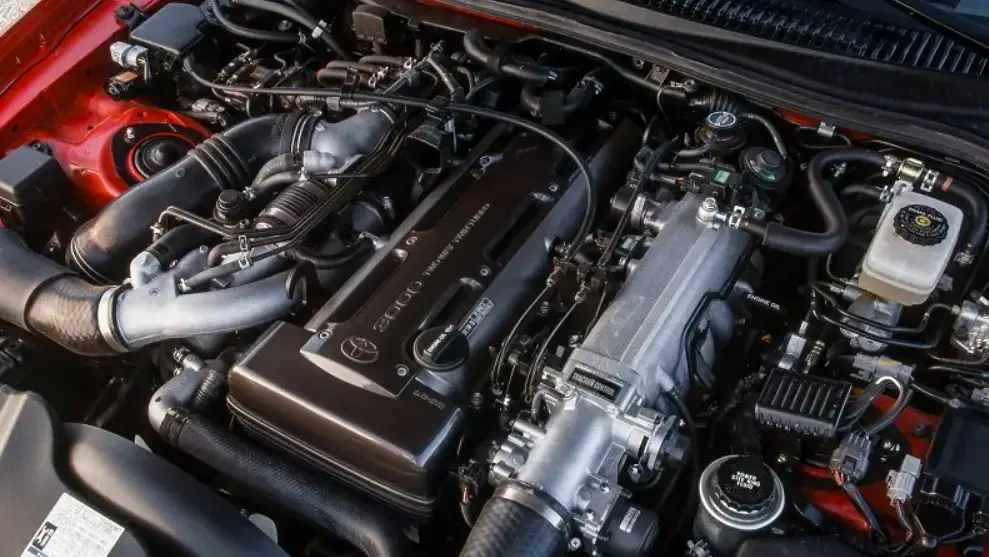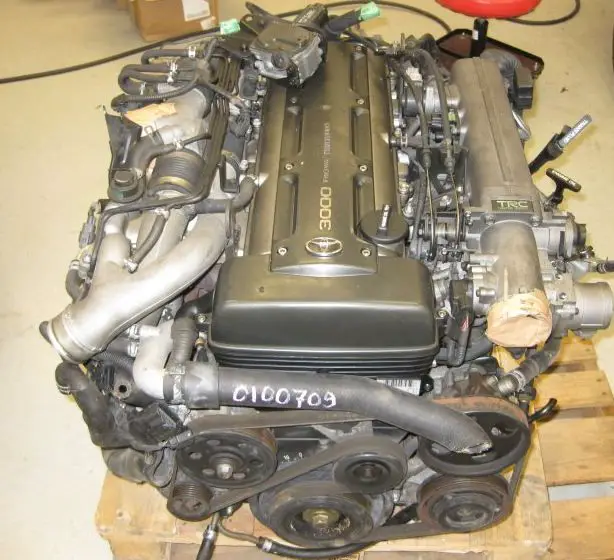The Toyota 2JZ engine is a 3.0-liter inline-six, available as the naturally aspirated 2JZ-GE (220 hp, 210 lb-ft) and turbocharged 2JZ-GTE (276 hp, 318 lb-ft). It’s renowned for its reliability and impressive tuning potential, making it a favorite among car enthusiasts.
The Toyota 2JZ engine is an icon in the automotive world, renowned for its robust performance and remarkable tuning potential. Whether you’re a car enthusiast, a mechanic, or simply curious about this powerhouse, understanding the specs and features of the 2JZ engine is essential.
In this blog post, we will dive deep into the specifications, design elements, and performance capabilities of the 2JZ engine while also addressing frequently asked questions.

Contents
A Brief Overview of the 2JZ Engine
The 2JZ engine is part of Toyota’s JZ family of engines, which were developed in the 1990s. Introduced in 1991, the 2JZ gained fame through its application in the Toyota Supra, particularly the A80 generation produced from 1993 to 2002. The 2JZ engine was designed as a powerful inline-six engine, available in several variants, primarily the 2JZ-GE and the 2JZ-GTE.
2JZ Engine Variants
The Toyota 2JZ engine has several variants, each designed for specific performance characteristics and applications. The two most notable variants are:
2JZ-GE (Naturally Aspirated):
- Configuration: Inline-6
- Displacement: 3.0 liters (2997 cc)
- Bore x Stroke: 86 mm x 86 mm
- Compression Ratio: 10.0:1
- Maximum Power: Approximately 220 hp (162 kW) at 5,600 RPM
- Maximum Torque: Approximately 210 lb-ft (285 Nm) at 4,000 RPM
- Fuel System: Multi-Point Fuel Injection (MPFI)
- Applications: Toyota Supra, Toyota Soarer, Toyota Crown
2JZ-GTE (Turbocharged):
- Configuration: Inline-6
- Displacement: 3.0 liters (2997 cc)
- Bore x Stroke: 86 mm x 86 mm
- Compression Ratio: 8.5:1
- Maximum Power: Approximately 276 hp (206 kW) at 5,600 RPM
- Maximum Torque: Approximately 318 lb-ft (431 Nm) at 4,000 RPM
- Fuel System: Electronic Fuel Injection (EFI)
- Turbocharger: Twin turbochargers (CT26)
- Applications: Toyota Supra Turbo, Toyota Soarer, Lexus GS300
Detailed Specifications of the 2JZ Engine
The Toyota 2JZ engine is celebrated for its robust construction and performance capabilities. Below are the detailed specifications of the most notable variants, the 2JZ-GE and 2JZ-GTE, along with their engineering features.
Engine Design and Features
The 2JZ engine is known for its strong, durable construction, which includes features that contribute to its longevity and performance:
- Block Material: The 2JZ features a cast iron block, which provides high strength and durability, enabling it to handle significant horsepower and torque increases.
- Cylinder Head: Made from aluminum, the cylinder head is designed for optimal airflow, contributing to improved performance. It features a DOHC (Double Overhead Camshaft) design, with four valves per cylinder, promoting efficient combustion and power output.
- Timing System: The 2JZ utilizes a timing belt system that connects the crankshaft and camshafts, ensuring precise valve timing for optimal engine performance.
- Oil System: The engine is equipped with a wet sump lubrication system, ensuring proper lubrication for all moving parts under various driving conditions.
Performance Characteristics
The 2JZ engine is renowned for its performance characteristics, making it a favorite among tuners and racers:
- Turbocharged Performance (2JZ-GTE): The twin-turbo setup provides rapid spool-up and increased power output, enabling the engine to reach high speeds with relative ease.
- Tuning Potential: The robust design allows for extensive tuning options. Many enthusiasts push the 2JZ-GTE to over 1,000 horsepower with the right modifications, making it a legendary engine in the tuning community.
- Reliability: The 2JZ is known for its reliability, even under high-stress conditions. Its forged internals and strong construction contribute to its ability to handle increased power without significant failure rates.
Fuel Efficiency
Despite its performance capabilities, the 2JZ engine manages to maintain decent fuel efficiency, particularly in the naturally aspirated 2JZ-GE variant. The fuel economy varies depending on driving conditions and modifications, but it generally ranges from 18 to 25 miles per gallon.
Cooling System
The 2JZ engine features an efficient cooling system designed to manage the heat generated during high-performance driving. It includes a large aluminum radiator, electric fans, and a water pump, which work together to maintain optimal operating temperatures.
Historical Significance and Popularity
The 2JZ engine has a rich history and cultural significance, particularly in the automotive community:
- Toyota Supra Legacy: The 2JZ is most famously associated with the Toyota Supra, which became a cultural icon in the 1990s, particularly through its appearance in the “Fast and Furious” franchise. The Supra’s combination of performance, styling, and tuning potential has made it a sought-after vehicle among car enthusiasts.
- Motorsport Success: The 2JZ engine has seen success in various motorsport disciplines, including drag racing, drifting, and circuit racing. Its ability to produce high power and torque levels makes it a competitive choice for racing applications.
- Tuning Community: The aftermarket support for the 2JZ is extensive, with numerous performance parts available for tuning. This has solidified its status as a favorite among car enthusiasts looking to maximize performance.

Maintenance and Common Issues
Maintaining a 2JZ engine is crucial for ensuring its longevity and performance. While the engine is known for its reliability, certain issues may arise:
Regular Maintenance
- Oil Changes: Regular oil changes are essential to keep the engine lubricated and functioning smoothly. Using high-quality synthetic oil is recommended, especially for turbocharged variants.
- Cooling System: Regularly check and maintain the cooling system to prevent overheating. This includes inspecting hoses, the radiator, and the water pump.
- Timing Belt Replacement: The timing belt should be replaced according to the manufacturer’s recommendations (usually every 60,000 to 100,000 miles) to prevent catastrophic engine failure.
Common Issues
- Oil Leaks: Some 2JZ engines may develop oil leaks over time, particularly around the valve cover gasket or rear main seal. Regular inspections can help identify and rectify these issues before they become severe.
- Turbocharger Wear: In turbocharged models, the turbocharger can experience wear over time. Regular inspections and maintenance can help prolong its lifespan.
- Fuel System Issues: Clogged fuel injectors or a failing fuel pump can lead to performance issues. Regular cleaning and inspection of the fuel system are recommended.
Frequently Asked Questions
Here are some FAQs about 2jz engine specs –
1. What makes the 2JZ engine so popular among car enthusiasts?
The 2JZ engine is popular due to its robust design, excellent performance capabilities, and significant tuning potential. Its association with the Toyota Supra and motorsport success further enhances its appeal.
2. Can the 2JZ engine handle high horsepower without significant modifications?
Yes, the 2JZ-GTE engine is known for its reliability and ability to handle high horsepower. Many enthusiasts achieve over 1,000 horsepower with the right modifications, including upgraded turbochargers, intercoolers, and fuel systems.
3. What are the differences between the 2JZ-GE and 2JZ-GTE?
The primary differences are that the 2JZ-GE is naturally aspirated with a higher compression ratio, while the 2JZ-GTE is turbocharged with a lower compression ratio and features a twin-turbo setup.
4. What kind of fuel should I use for the 2JZ-GTE engine?
For optimal performance, it is recommended to use premium unleaded gasoline with an octane rating of 91 or higher. This helps prevent knocking and allows the engine to perform at its best.
5. How can I increase the performance of my 2JZ engine?
Performance can be increased through various modifications, such as upgrading the turbocharger, installing a larger intercooler, optimizing the fuel system, and tuning the engine’s ECU for better power delivery.
Conclusion
The Toyota 2JZ engine is a remarkable piece of engineering that has left a lasting impact on the automotive landscape. With its impressive specifications, tuning potential, and historical significance, the 2JZ continues to be a favorite among car enthusiasts, tuners, and racers alike. Whether you own a 2JZ-powered vehicle or simply appreciate its engineering excellence, the legacy of this engine is sure to endure for years to come.